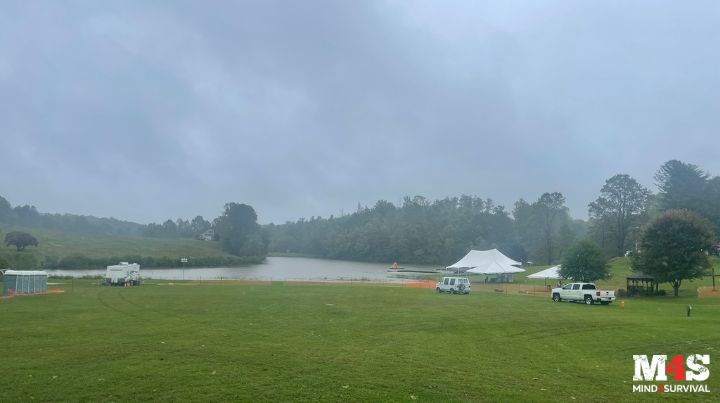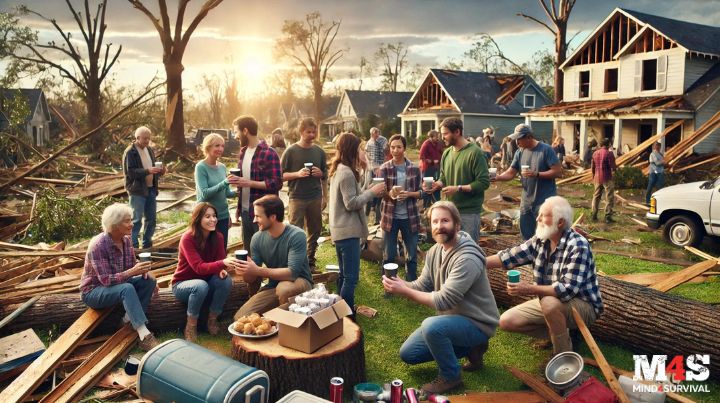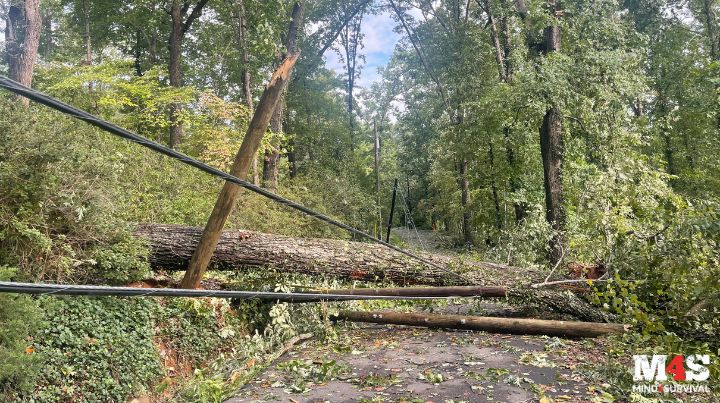Podcast: Play in new window | Download
In episode 210 of the Mind4Survival podcast, I share my firsthand experience of surviving Hurricane Helene’s impact zone near Asheville, North Carolina. It was a chance to reflect on preparedness, risk management, and the unexpected ways a community can come together during a crisis. Let me walk you through the journey—what I planned, what I saw, and what I learned along the way.
Quick Look at What You’ll Learn
A Mindset for the Unexpected
Before I even set foot in North Carolina, my thoughts were focused on preparation. Having experienced hurricanes, warzones, and all kinds of calamities in my life, I knew that survival starts long before a disaster strikes. I’m talking about analyzing risks and making informed decisions. Risk is part of life, whether it’s a hurricane or just a road trip. So, what risks was I considering?
Well, for one, I was driving from Texas to North Carolina. That’s a lot of miles with potential hazards, from traffic accidents to breakdowns. My truck, reverently named “Great White,” was packed with survival gear—100 gallons of diesel, food, water filtration systems, and even a portable chainsaw for emergencies. This gave me flexibility, but I still needed to get there safely.
Next came the storm itself. Would I face flooding? Fallen trees? What is the worst-case scenario of being cut off for days? These were all things I considered while deciding where to stay and how to manage the risks once I got there. I even factored in the location of my Airbnb—it was up in the hills, away from flood zones, and had a basement where I could hunker down if needed.
Facing the Storm

The storm hit hard on Friday morning. Around 7:30 a.m., the winds ramped up, and trees started falling. By mid-morning, it felt like a microburst had ripped through the area. Trees came down everywhere, blocking roads and cutting off communities. Power lines snapped like twigs, and I realized that being stuck in this isolated area was becoming a reality.
My host’s house didn’t escape unscathed. A massive oak tree crashed through the roof, destroying two rooms and damaging their cars. It was a scene of chaos, but thanks to my preparedness mindset, I wasn’t rattled. I knew I had the gear to ride out the storm, and my truck had become my lifeline.
The Power of Preparedness
One thing that stood out to me during this experience was the importance of maintaining a calm, collected mindset in the face of chaos. My host, Julie, was understandably shaken. But when you’re prepared, staying level-headed and reassuring others is more accessible. I helped them by cutting up fallen branches with my portable chainsaw and clearing a path to their door, making them feel more in control of the situation.
At the same time, I started to understand just how vital community can be in these situations. Neighbors checked in on each other, bringing coffee and food and even offering generators to those in need. It reminded me of the old days when people looked out for one another, not because they had to, but because they wanted to. And it was heartwarming to see, especially in a world where division often feels like the norm.
Strengths, Weaknesses, and Lessons

Through this experience, I learned several valuable lessons about disaster preparedness. First, having a well-stocked truck was a considerable strength. Knowing that I could power my electronics, store water, and keep myself fed if we were cut off for several days gave me peace of mind.
However, one weakness became clear—trees. No matter how prepared I was, I couldn’t control the massive oaks falling all around. If one had landed on my truck, it would’ve been game over for my supplies. The unpredictability of nature is always a wild card.
As for opportunities, I realized that people love having a “survivalist” in their midst when disaster strikes. While Julie and her husband were initially unsure about having me—a prepper—stay with them, they quickly saw the benefits. When you can show people the value of preparedness without going overboard, it helps change perspectives.
Finally, one major threat to consider is how quickly a local disaster can overwhelm even the best-prepared communities. While the neighbors all pulled together, it was clear that the damage was too much for anyone to handle on their own. Without help from outside sources, we would’ve been stuck for days.
The Bottom Line About Surviving Hurricane Helene
Hurricane Helene reminds us why we prepare. It’s not just about surviving a disaster; it’s about making life manageable when things go sideways. Whether it’s keeping the lights on with a generator, staying connected with backup communication systems, or simply having enough food and water to last a week, preparedness makes all the difference.
In moments like these, community becomes just as important as the gear we carry. People come together when the power goes out and the roads are blocked. They share what they have, check in on each other, and make sure everyone is okay. That’s the true power of preparedness—not just surviving but helping others survive, too.
Stay safe,

Read the full article here





